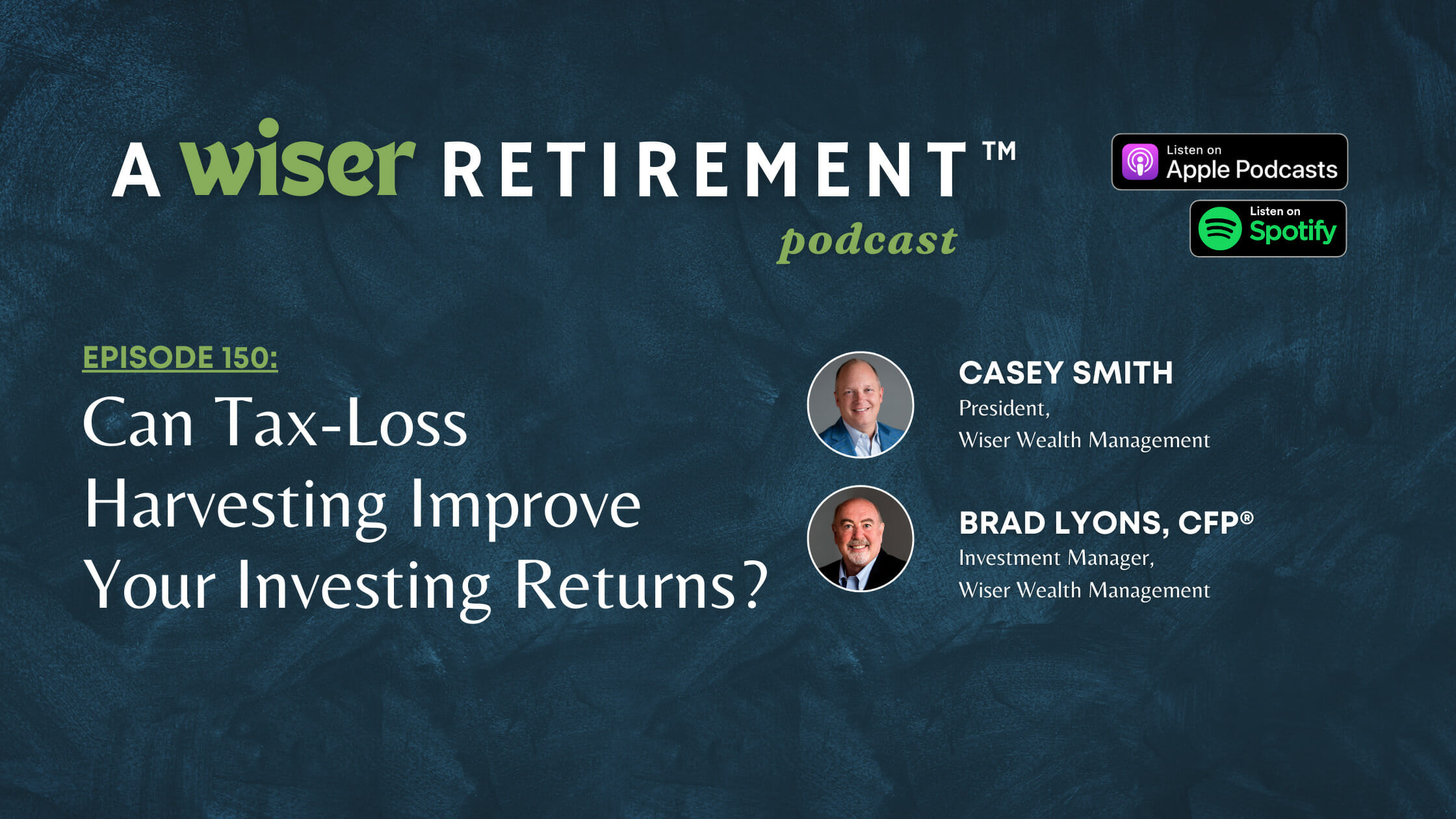
Can Tax-Loss Harvesting Improve Your Investing Returns?
On this episode of A Wiser Retirement™ Podcast, Casey Smith, and Brad Lyons, CFP®, discuss whether tax-loss harvesting can improve your investing returns. They talk about how this strategy can help investors use market value losses of securities to offset gains and remain invested with a diversified portfolio.
Listen on Apple Podcasts or watch on YouTube:
SUMMARY:
Tax-Loss Harvesting and Investing
In this episode, we will not cover IRAs, 401K plans, or SEPs. The tax-loss harvesting strategy we discuss applies solely to money in a brokerage account. This usually occurs when someone owns a business, inherits money, or was able to save a lot throughout their life.
In financial planning, we ensure that clients understand that liquidating debt is a really important step on the road to financial success. We counsel them to pay off their car, and mortgage in preparation for retirement. When that happens early enough, excess cash is created. This extra cash goes into what we call an opportunity fund. Inside opportunity funds, money is invested differently than in long-term growth funds. When nearing retirement, if this money hasn’t been used, you can use it during retirement to live off of it with meager tax consequences. Before that though, while in the period of setting money aside, we also invest it. Simultaneously, looking for opportunities to utilize the tax-loss harvesting strategy.
What is Tax-Loss Harvesting?
Tax-loss harvesting is an investment strategy to increase your overall net after-tax return on the investment portfolio. If over time an investor has accumulated a position in a single stock or two and they have significant gains, in order to diversify away from that, they may want to use what we call a tax-loss harvesting strategy. Another way to use the tax-loss harvesting strategy is just as an ongoing investment strategy to utilize losses in the account to offset gains in other areas of the account. Overall, it is designed to utilize a decline in market value of any one security to offset a gain in any other security in the account on your tax return.
In a diversified portfolio, in any given year the S&P 500 for example, may experience as many as 50% of securities having a decline in value. Consequently, there are always opportunities to harvest losses. This is an interesting strategy given the fact that it’s constantly in motion. It is done over a number of years and the length of time it might take for this to be done can also be projected.
Direct Indexing
Direct indexing is a way to utilize the tax-loss harvesting strategy, because you’re investing directly in the securities that make up an underlying index, such as the S&P 500. Financially oriented softwares have made this possible over the past few years. They are able to invest an entire portfolio into the S&P 500 directly and then track those securities as movements, as they go up and down, and that way find losses. Then, immediately sell that, harvest the loss, take that money, and reposition it into a security alike, allowing the investment to remain in the same category.
Additionally, you can purchase direct funds, and they are able to perform some of these same strategies. Normally, these funds are available through private banks, for example, you can buy a tax-loss harvested S&P 500. Although, that’s probably off-limits to a lot of investors. However, this is something that wealth management firms, like ours have direct access to. Therefore, direct funds can help make the tax-loss harvesting strategy a little simpler, too. In contrast, it is often mostly offered to high-net-worth individuals or family office distribution areas, given the fact that these groups benefit the most from these strategies.
Is Tax-Loss Harvesting for You?
The tax-loss harvesting strategy is an investment strategy to increase one’s overall net after-tax return on the investment portfolio. Ultimately, this approach is designed to utilize a decline in market value of any one security to offset a gain in any other security in the account on your tax return. Investors can greatly benefit from this strategy if well-guided by someone who understands it thoroughly.
Download our eBook on “Top Reasons Most Financial Plans Fail”
TIMESTAMPS:
0:00 Intro
5:29 Tax-Loss Harvesting and Investing
7:49 What is tax-loss harvesting?
10:10 Direct indexing
LINKS:
Learn more about Casey Smith and Brad Lyons, CFP®
CONNECT:
Twitter, Instagram, Facebook, LinkedIn, and YouTube.
Learn more about A Wiser Retirement™ podcast and access previous episodes.
Share This Story, Choose Your Platform!
Wiser Wealth Management, Inc (“Wiser Wealth”) is a registered investment adviser with the U.S. Securities and Exchange Commission (SEC). As a registered investment adviser, Wiser Wealth and its employees are subject to various rules, filings, and requirements. You can visit the SEC’s website here to obtain further information on our firm or investment adviser’s registration.
Wiser Wealth’s website provides general information regarding our business along with access to additional investment related information, various financial calculators, and external / third party links. Material presented on this website is believed to be from reliable sources and is meant for informational purposes only. Wiser Wealth does not endorse or accept responsibility for the content of any third-party website and is not affiliated with any third-party website or social media page. Wiser Wealth does not expressly or implicitly adopt or endorse any of the expressions, opinions or content posted by third party websites or on social media pages. While Wiser Wealth uses reasonable efforts to obtain information from sources it believes to be reliable, we make no representation that the information or opinions contained in our publications are accurate, reliable, or complete.
To the extent that you utilize any financial calculators or links in our website, you acknowledge and understand that the information provided to you should not be construed as personal investment advice from Wiser Wealth or any of its investment professionals. Advice provided by Wiser Wealth is given only within the context of our contractual agreement with the client. Wiser Wealth does not offer legal, accounting or tax advice. Consult your own attorney, accountant, and other professionals for these services.





